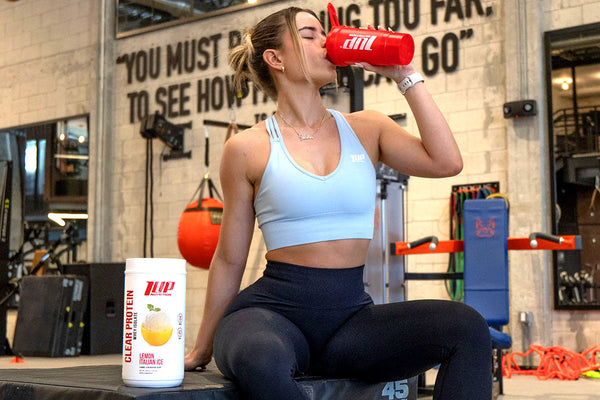There are many myths about protein -- it’s bad for your kidneys, leads to inflammation, makes your bones brittle, etc.
One thing is indisputable -- your body needs protein. It is an essential macronutrient, after all.
You see, our bodies require certain amino acids, and our body cannot produce them. This means wemust eat protein in order to get the essential amino acids (EAAs) we need to not only ensure survival, but fuel our health and fitness goals too (building muscle, gaining strength, losing body fat).
How can you be sure you’re getting enough protein?
The surefire way is to log your food intake with the 1UP Fitness app. Doing so enables you to easily track your calories and macros so that you can see how much you’ve eaten throughout the day and make sure you’re eating for your desired goals.
For those times when you may not be able to track your meals or if you want a break from logging your foods, there are a few tell-tale signs that you’re not getting enough protein.
Signs You’re Not Getting Enough Protein
Feeling Hungry & Unsatisfied After Meals
Protein plays two key roles in fat loss.
First, it helps your body retain lean muscle during a calorie deficit. You see, when you’re not eating enough calories, your body will turn to its own energy stores to get the calories it needs to meet energy demands. Muscle is incredibly “expensive” for your body to maintain from an energy standpoint. So, if you’re not consuming enough energy from food, your body may resort to breaking it down.
Consuming enough protein (and engaging in resistance training) help protect your muscle from breakdown by providing a powerful reminder to your body that it needs the muscle it has. As a result, your body turns to stored body fat for the energy it needs to keep going.
Second, protein helps to increase feelings of satiety, which helps you to not snack/overeat and thus maintain your calorie deficit so you lose body fat.
Not consuming enough protein can lead to muscle loss and/or feeling hungry shortly after eating a meal. This can lead to overeating and potential fat gain.
Not Recovering from Workouts
Hard training is essential to building muscle and strength. During intense workouts, microtears occur in muscle fibers, and our muscles require protein to repair the damage and fuel the recovery and growth processes.
Not consuming enough daily protein can lead to increased muscle soreness, delayed recovery, and poor performance in subsequent workouts.
Brittle Nails/Hair Loss
If your nails easily chip or your hair is looking thin and brittle, it could be a sign you’re not getting enough protein. Remember, collagen and keratin are two important proteins for healthy hair, skin and nails. Since collagen isn’t normally included in many of the foods we commonly eat, we developed an effective collagen supplement to support the body’s needs of this critical building block.
Not consuming enough protein can also lead to dry, thin skin and poor wound healing.
If you’re noticing any of these, then you may not be consuming enough protein each day.
How Much Protein Should You Eat Each Day?
The Dietary Reference Intake (DRI) for protein is 0.36 grams of protein per pound (0.8 grams per kg) of body weight.[1]
This amounts to:
- 56 grams per day for the average sedentary man
- 46 grams per day for the average sedentary woman
Suffice it to say that this is not enough protein each day for an active individual looking to build muscle or lose fat while maintaining lean muscle mass. Keep in mind that the above intake is the bare minimum amount of protein needed to sustain life and maintain muscle for sedentary individuals.
For those of you looking to improve body composition, athletic performance, and overall health, thecurrent evidence-based recommendations for protein intake for active individuals is between 1.6-2.2 grams of protein per kilogram of bodyweight.[2,3]
To make things even simpler, aim for one gram of protein per pound of bodyweight.
So, if you weigh 130 pounds, aim to consume at least 130 grams of protein each day. Ideally, you would evenly divide your protein intake across 3-5 meals/snacks during the day.
How to Get More Protein In Your Diet
Not sure how you’re going to hit your protein goals each day?
Here is an example day:
- Breakfast (8AM): 3-egg veggie with fresh fruit and toast
- Pre-Workout Drink (10AM)
- Post-Workout Shake (11AM): 1UP Clear Protein, 1UP Whey or 1UP Vegan Protein
- Lunch (1PM): Grilled salmon + spinach salad
- Snack: String cheese + almonds + apple
- Dinner: Steak + potatoes + roasted asparagus/Brussels sprouts
- Pre-Bed Snack: Greek yogurt + berries or homemade protein bar
Takeaway
Eating enough protein is essential to getting the results you want, be it fat loss, muscle gain, or body recomposition. Not consuming enough protein can lead to feelings of hunger, fatigue, excessive muscle soreness, and brittle hair and nails.
To keep things simple, aim to eat ~1 gram of protein per pound of bodyweight each day. This provides your body with enough “raw material” to support all the various biological processes that occur throughout the day.
And, if you want help hitting your protein goals for the day, having a premium-quality protein powder, such as 1UP Clear Protein, 1UP Whey or 1UP Vegan Protein, makes it that much easier and more delicious to give your body what it craves!





